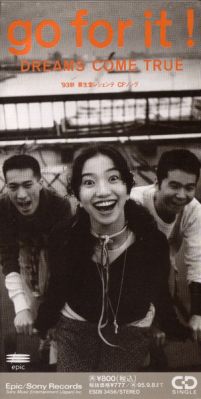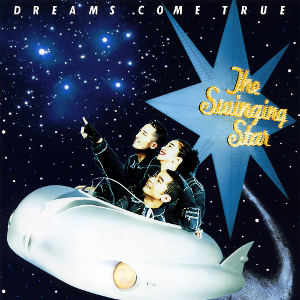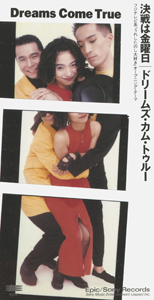
First Love is the debut Japanese-language studio album by Japanese-American recording artist Hikaru Utada, released on March 10, 1999, by Toshiba-EMI.

Utada Hikaru Single Collection Vol. 1 is the first compilation album by Hikaru Utada, released on March 31, 2004. It features all A-sides of her hit singles to that date, including 11 number-one hits and all 15 tracks reached the top 5. The album version was remastered by Ted Jensen. The album was released on iTunes in April 2004.

Concentration 20 is the third studio album by Japanese singer Namie Amuro. It was released on July 24, 1997, by Avex Trax. The album's musical style is a fusion of genres including pop, dance, rock, reggae and ska. Unlike Amuro's previous effort, Sweet 19 Blues (1996), which primarily had lyrics written by Tetsuya Komuro, Concentration 20's lyrics were mostly written by Marc Panther. Komuro did, however, compose and arrange most of the album's songs and wrote the lyrics to three of them. It was Amuro's second solo album since splitting up with Super Monkey's.

"Addicted to You" is a song by Japanese-American recording artist Hikaru Utada from her second studio album Distance (2001). It was released as the album's lead single on November 10, 1999 by EMI Music Japan. "Addicted to You" was written by Utada and produced by Jimmy Jam & Terry Lewis; this is Utada's first collaboration with American producers and composers. The single artwork was shot by American photographer Richard Avedon and features two black-and-white figures of Utada. Musically, "Addicted to You" is an R&B song.

181920 is debut greatest hits album by Japanese singer Namie Amuro. Avex Trax released it in Japan on January 28, 1998, and it was later available in a variety of formats throughout Asia. The album contains Amuro's single releases from her debut studio album Dance Tracks Vol. 1 (1995) to her third album Concentration 20 (1997), as well as three tracks from her time with Toshiba-EMI. The album also included a new song called "Dreaming I Was Dreaming," which served as the only single from the album.

Yureru Omoi is the fourth album by Zard and was released on July 10, 1993 under B-Gram Records. This is the first original album released in about 10 months since the last album Hold Me. It is also the first album by Izumi Sakai as a solo unit since her first album Good-bye My Loneliness. The release was postponed several times, but was finally released on July 10. In addition, the order form at CD stores indicated that the album title was "Kimi ga Inai" and that it would be released simultaneously with the single "Yureru Omoi" on May 19.

Best Fiction is the third greatest hits album by Japanese singer Namie Amuro. It was released on July 30, 2008, by Avex Trax and features seventeen singles released between 2002-2008, which included five new songs, three of which were released as a triple A-side single called "60s 70s 80s." Furthermore, the album tracks "Do Me More" and "Sexy Girl" were released as digital singles.

"Go for It!" is the 13th single by the Japanese band Dreams Come True, which also served as the lead single for their sixth studio album Magic (1993). It was released on September 9, 1993, by Epic Records Japan. It was the only single released by the group that year. "Go for It!" was the advertising song for Shiseido's product "Rescente" starring Miwa Yoshida, the lead singer of Dreams Come True.

The Swinging Star is the fifth studio album by the Japanese band Dreams Come True. It was released on November 14, 1992, by Epic Records Japan. It was their first release in about a year since their previous album, Million Kisses (1991). All of the album's lyrics were solely penned by frontwoman Miwa Yoshida while its songs were arranged by her bandmate Masato Nakamura. The Swinging Star is a doo-wop, pop, blue-eyed soul, and R&B record, with elements of jazz and disco music.

Past<Future is the ninth studio album by Japanese pop singer Namie Amuro. It was released on December 16, 2009, through Avex Trax. This was her first original album to be released in two and a half years. The record came after the release of her blockbuster greatest hits album Best Fiction (2008), which sold over a million copies. Unlike her previous studio albums, Queen of Hip-Pop (2005) and Play (2007), Past<Future features a more electropop and synth-pop sound that was prevalent in the western music charts at the time.

Best Selection 2010 is the first Japanese greatest hits album from South Korean pop group Tohoshinki, released in Japan on February 17, 2010, by Rhythm Zone. It contains songs from their albums Heart, Mind and Soul (2006), Five in the Black (2007), T (2008) and The Secret Code (2009). It also features four new singles, two of which are certified platinum by the Recording Industry Association of Japan (RIAJ). Best Selection 2010 is the final album release by the group with its original five-member lineup.

"Love Love Love" is a song recorded by Japanese band Dreams Come True for their eighth studio album, Love Unlimited ∞. It was released as the album's lead single by Epic/Sony Records on July 1995. It is the theme song to the TBS drama series Aishiteiru to Itte Kure. The single's B-side, "Arashi ga Kuru", was also featured throughout the series' twelve episodes. With over two million copies sold, "Love Love Love" is the tenth best-selling Japanese single of all time and remains the band's most successful single.

Love Unlimited∞ is the eighth studio album by Japanese band Dreams Come True. It was released in Japan and throughout Asia on April 1, 1996, through Epic Records Japan, ultimately being their last album released under the label. The record's lyrics were entirely written by Miwa Yoshida herself, while the song's compositions were handled by her alongside bandmates Takahiro Nishikawa and Masato Nakamura. Musically, Love Unlimited∞ is a pop and R&B album and lyrically focuses on themes of love. Two music videos are included on the CD-EXTRA of the Japanese version only. They are not included on the local versions sold in Taiwan, Hong Kong, etc. The slogan on the obi is, as the title suggests, "Love has no limits."

"Kessen wa Kinyōbi" is a song recorded by Japanese band Dreams Come True for their fifth studio album, The Swinging Star. It was released as the album's lead single by Epic/Sony Records on September 19, 1992. It served as the opening theme to the CX music show Ureshi Tanoshi Daisuki - Friday Night Live, on which the band were regular cast members. The single's coupling song, "Taiyō ga Miteru" was used in the advertising campaign for Fujifilm's Fujicolor Super HG 400 film.

Delicious is the seventh original studio album released by Japanese pop band Dreams Come True. It was distributed in Japan and across Asia on March 25, 1995, through Epic Records Japan. The record was released 1 year and 3 months after their previous album Magic. This is the first time that Dreams Come True, who have been releasing albums at a pace of one a year, have released an album that came out more than a full year after its predecessor. Delicious was also their first original album with 13 songs. The MiniDisc edition of the album was released on March 18, 1995, one week in advance of the CD and cassette edition. Delicious is primarily a pop record with influences of funk, R&B and tango.















